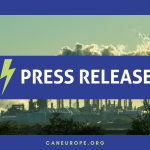In view of the discussions on the own-initiative report “The impact on the fishing sector of offshore wind farms and other renewable energy systems” (2019/2158(INI)) in the parliament, we would like to present our views on this topic. Climate change hits our ocean and seas strongly. The rising concentration of greenhouse gas emissions is having a double impact on our ocean and seas: it is driving up water temperatures and causing acidification, which interact to the detriment of marine ecosystems. Warmer and more acidic seawater will negatively affect fishery and aquaculture.
Increase in water temperatures will contribute to a restructuring of marine ecosystems with implications for ocean circulation, biogeochemical cycling and marine biodiversity. Ocean acidification will affect the ability of some calcium carbonate-secreting species (as molluscs, planktons and corals) to produce their shells or skeletons[1].
In order to limit the impact of climate change on our society, EU Member States need to commit to a climate-neutral economy by 2040 by phasing out fossil fuels and committing to energy efficiency and a transition of our energy system to one that is 100% based on renewable energy sources.
Letter to MEPs on offshore renewable energy development and its impact on the fishing sector



